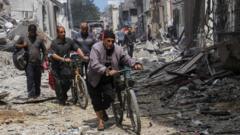The ongoing Israeli military operations are intensifying humanitarian fears as residents grappling with frequent evacuations seek refuge amid continued bombings.
Escalating Tensions: Hundreds of Families Flee in Latest Israeli Air Strikes on Gaza

Escalating Tensions: Hundreds of Families Flee in Latest Israeli Air Strikes on Gaza
A devastating wave of air strikes in Gaza leads to mass displacements and rising casualties.
Hundreds of Palestinian families have been forced to evacuate their homes following a series of Israeli air strikes throughout the Gaza Strip, according to local reports. Emergency response teams have been able to recover the bodies of five individuals, while many injured civilians were rushed to Al-Ahli Hospital in Gaza City. These strikes come on the heels of one of the most significant evacuation orders issued since hostilities reignited in March, with increasing calls for Israeli Prime Minister Benjamin Netanyahu to consider a ceasefire.
Residents from areas in Gaza City reported that numerous air raids targeted heavily populated neighborhoods such as Shujaiya, Tuffah, and Zeitoun. Activists shared videos on social media showcasing the chaos ensuing from the bombardments, with explosions lighting up the night and thick smoke billowing from affected sites. Notably, a school in Zeitoun, which was serving as a temporary shelter for displaced individuals, was struck, exacerbating the already dire situation.
The fatalities from the attack reportedly took place in Al Shati camp, located to the west of Gaza City. In advance of the strikes, the Israel Defense Forces (IDF) had issued evacuation orders for many northern Gaza residents, anticipating large-scale attacks. Many families who fled overnight sought refuge in western Gaza City instead of complying with IDF instructions to move south.
"We had no choice but to leave everything behind," lamented Abeer Talba, a mother of seven, as her family fled Zeitoun amid the chaos. "We received phone calls instructing us to evacuate immediately. This is the seventh time we've been forced to flee. We're out on the streets again, with no food or water. My children are starving. Death feels kinder than this."
As the humanitarian crisis escalates, there are growing concerns that the evacuation orders and continuous air strikes may indicate a broader Israeli strategy to expand military ground operations deeper into Gaza, a prospect that raises alarms among both civilians and former military officials. Speculation in Israeli media suggests many generals believe military objectives in Gaza are nearing completion. However, this view is met with anxieties about a shift toward an attritional, guerrilla-style warfare, which could lead to increased fatalities among hostages, civilians, and soldiers alike.
As international and domestic pressures mount, all eyes are now on Prime Minister Netanyahu and his future decisions regarding the war and potential moves towards a ceasefire agreement.
Residents from areas in Gaza City reported that numerous air raids targeted heavily populated neighborhoods such as Shujaiya, Tuffah, and Zeitoun. Activists shared videos on social media showcasing the chaos ensuing from the bombardments, with explosions lighting up the night and thick smoke billowing from affected sites. Notably, a school in Zeitoun, which was serving as a temporary shelter for displaced individuals, was struck, exacerbating the already dire situation.
The fatalities from the attack reportedly took place in Al Shati camp, located to the west of Gaza City. In advance of the strikes, the Israel Defense Forces (IDF) had issued evacuation orders for many northern Gaza residents, anticipating large-scale attacks. Many families who fled overnight sought refuge in western Gaza City instead of complying with IDF instructions to move south.
"We had no choice but to leave everything behind," lamented Abeer Talba, a mother of seven, as her family fled Zeitoun amid the chaos. "We received phone calls instructing us to evacuate immediately. This is the seventh time we've been forced to flee. We're out on the streets again, with no food or water. My children are starving. Death feels kinder than this."
As the humanitarian crisis escalates, there are growing concerns that the evacuation orders and continuous air strikes may indicate a broader Israeli strategy to expand military ground operations deeper into Gaza, a prospect that raises alarms among both civilians and former military officials. Speculation in Israeli media suggests many generals believe military objectives in Gaza are nearing completion. However, this view is met with anxieties about a shift toward an attritional, guerrilla-style warfare, which could lead to increased fatalities among hostages, civilians, and soldiers alike.
As international and domestic pressures mount, all eyes are now on Prime Minister Netanyahu and his future decisions regarding the war and potential moves towards a ceasefire agreement.


















